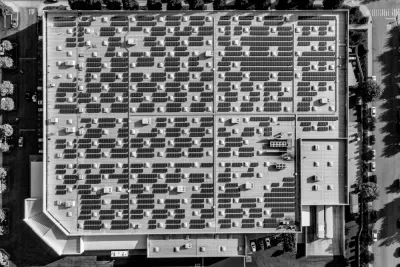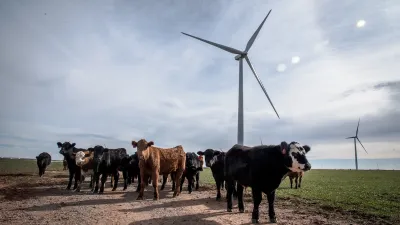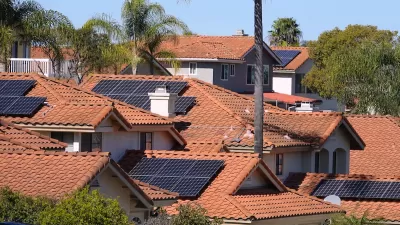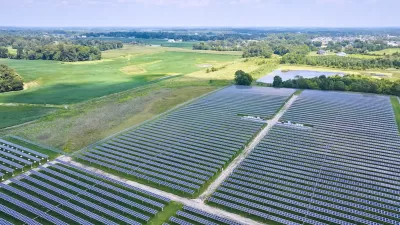The cheap price of solar and wind energy have corporations "falling all over themselves" to embrace renewable, according to this article. Target and Wal-Mart lead the green arms race.

Bruce Horovitz reports that big box stores, not exactly known for environmental friendliness in terms of transportation and land use, have wholeheartedly embraced the environmental friendliness of renewable energy, namely rooftop solar.
Take Target as an example, writes Horovitz:
Target is so serious about being viewed as a friend of the planet that by November, the company said, it will have erected rooftop solar panels on 500 of its stores in the United States. That’s more than one-quarter of its total 1,855 stores, and Target expects to reach that goal one year earlier than projected.
Target is now outpacing Wal-Mart, which was an early adopter of a large-scale solar installation program. "In its relentless bid to out-green archrival Walmart, Target also has ranked No. 1 in on-site solar capacity for three years in a row in the Solar Energy Industries Association’s Solar Means Business report, a survey of corporate solar users," according to Horovitz
The actions of Target and Wal-Mart reflect larger trends among large retails toward solar initiatives as a win for bottom lines and public images. And reneaable energy isn't just popular with big box stores. In total, "companies in the United States purchased three times as much power generated from solar and wind energy in 2018 than they did the year before," reports Horovitz.
FULL STORY: From the Rooftops, Big Box Stores Are Embracing Solar

Manufactured Crisis: Losing the Nation’s Largest Source of Unsubsidized Affordable Housing
Manufactured housing communities have long been an affordable housing option for millions of people living in the U.S., but that affordability is disappearing rapidly. How did we get here?

Americans May Be Stuck — But Why?
Americans are moving a lot less than they once did, and that is a problem. While Yoni Applebaum, in his highly-publicized article Stuck, gets the reasons badly wrong, it's still important to ask: why are we moving so much less than before?

Research Shows More Roads = More Driving
A national study shows, once again, that increasing road supply induces additional vehicle travel, particularly over the long run.

Judge Halts Enforcement of Anti-Homeless Laws in Grants Pass
The Oregon city will be barred from enforcing two ordinances that prosecute unhoused residents until it increases capacity and accessibility at designated camping sites.

Advancing Sustainability in Los Angeles County Schools
The Los Angeles County Office of Education’s Green Schools Symposium brings together educators, students, and experts to advance sustainability in schools through innovative design, climate resilience strategies, and collaborative learning.

Using Old Oil and Gas Wells for Green Energy Storage
Penn State researchers have found that repurposing abandoned oil and gas wells for geothermal-assisted compressed-air energy storage can boost efficiency, reduce environmental risks, and support clean energy and job transitions.
Urban Design for Planners 1: Software Tools
This six-course series explores essential urban design concepts using open source software and equips planners with the tools they need to participate fully in the urban design process.
Planning for Universal Design
Learn the tools for implementing Universal Design in planning regulations.
City of Moreno Valley
Institute for Housing and Urban Development Studies (IHS)
City of Grandview
Harvard GSD Executive Education
NYU Wagner Graduate School of Public Service
City of Cambridge, Maryland
Newport County Development Council: Connect Greater Newport





























